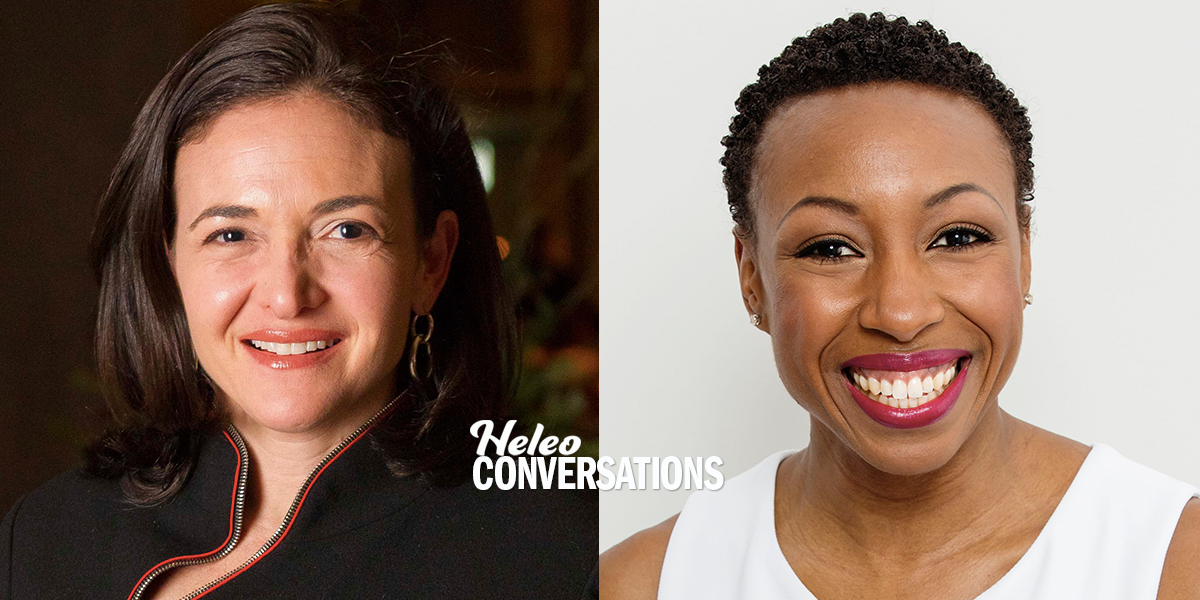Sheryl Sandberg joined Facebook as COO in 2008, leaving a senior role at Google to help transform Mark Zuckerberg’s social network into a highly profitable tech giant. Additionally, Sheryl is known for her book Lean In, which focuses on empowering women in the workplace. This is a familiar mission to Tiffany Dufu, the Chief Leadership Officer at Levo, a network designed to elevate working women. Tiffany recently joined Sheryl for a talk about young adulthood, leadership, and feminism. Her questions for Sheryl were fielded from Twitter and from the audience at Levo, which hosted the conversation.
Tiffany: Leadership is simple enough when things are going really well. Can you share a failure or a sticky moment when things didn’t go so smoothly and how you managed that?
Sheryl: Probably the biggest one for me was my divorce. I got married really young, right out of college. I married an amazingly wonderful man, we’re still friends. I don’t think I knew who I was, and I don’t think I knew what I wanted, and I don’t think I was mature enough to be married. I hadn’t thought about any of that. That marriage unraveled, and that is a hard thing at 25. I think women feel a lot of pressure to get married. A lot of people tell you, “You got to get a good man.”
I actually saw a recent article—someone advised women of Princeton to find their husband when they’re at Princeton. I could not disagree more. Study hard while you’re at Princeton, or wherever you are. Find a husband or partner when you are a fully formed adult who knows what you want. Feeling like I needed to be married to be complete really lead me in the wrong direction.
Unraveling a marriage at 25 is really painful. I felt like I had a scarlet letter “D” on my chest for years, no matter what else happened. My ex-husband and I are still close friends. He has a wonderful family, and I have a wonderful family, and I made a decision of who to partner with as a more fully formed adult.
Tiffany: Our next question comes from Anita who’s in New Jersey, and she’s very interested in the biggest risk you ever took and how you talked yourself into it.
Sheryl: One of them was going to work for a 23 year old at a company called Facebook, which sounds really obvious until you remember that I was 38 and Facebook was a site for kids. A lot of people thought I was nuts at the time. I really believed in Mark, I really believed in what he was doing, and he was a wonderful person. Mark looked at me and said, “What would you do if you weren’t afraid? Stop trying to please everyone, that’s not going to work. You’re never going to have an impact on the world if you’re always trying to make everyone happy. You have to say things, and when you say things some people will agree and some people disagree. You’ll start real conversation.”
Probably the other one was in 2001. I was in the Clinton government, and George Bush came in. They kick you out if you’re a political appointee, and I moved to Silicon Valley. No job, no real prospects, and it took me 10 months to find a job. Many people refused to hire me in those 10 months. One of them looked at me and said, “I would never hire someone like you.” This was in the first few minutes of the interview. I was like, “Okay. Hold it together. Don’t cry in this office. Ask three questions and exit with grace.” I didn’t cry, but I’m not sure I actually exited with grace.
I got through it, and I’m friendly with her now. It wasn’t obvious, at the time, to go to Silicon Valley. It sounds obvious now, but this was after the first bubble burst. I really wanted to do something I believed in, and I took that chance, and it paid off.
Trending: How to Transform Daily Habits into Life-Changing Rituals
Tiffany: Thank you for sharing that. When people ask me now, “How could you go and work for such young people?” I say, “That’s the same question people asked Sheryl about Mark and it worked out!”
Caitlin wants to know your advice for women who would like to ask for a flexible job schedule with their manager. How do you do that?
Sheryl: What is also true about the success and likability penalty women face is that we have to negotiate differently. The basic advice for women is that men can negotiate for themselves and pay no penalty. Women, when we negotiate for ourselves, we have to justify it and be communal. We have to say things like “we” and smile and explain why what we want, like a flexible schedule or a pay raise or a promotion, is justified.
I hate this advice. I want to be clear, I don’t like the advice I’m giving, but I’m a pragmatist. I think it’s also very empowering to know how to negotiate in a smart way, even if you don’t quite like the system the world has set up for you. Negotiate well, and then you get to set the rules. Then you can have training seminars in your company for why we shouldn’t mind when women negotiate like men, and you can change the dynamic. I do think as women we need to position our negotiations for ourselves very carefully, and that’s what the data shows.
Tiffany: Another question asks about being on the other side of that table. It comes from Heather, from Twitter. What are you looking for when you hire Gen Y employees?
“Career progression is a jungle gym, not a ladder. The days of joining one company and moving up straight through the ranks are basically over.”
Sheryl: I’m looking for someone who has done their work and is talking about what they’re going to give to the organization, not what it’s going to do for them. When you’re an organization and you’re hiring, of course we want to develop people, but that’s not our primary concern. Our primary concern is building our organization. The best hiring story of my career is a woman named Lorrie Goler. When I first went to Facebook she called me and said, “I want to come apply to work for you at Facebook. I was going to tell you all the things I’m good at and all the things that I like to do and what my goals are, but I figured everyone’s doing that. I want to know what’s your biggest problem and can I solve it?”
I thought, “You’re hired.” My biggest problem is recruiting. She was in marketing. She’s been running recruiting, and now HR, at Facebook brilliantly for five years. When we go look for a job we have to remember that it’s not about us, it’s about them. You’ve done your homework, you understand what you can contribute, you can articulate why you are going to make that organization succeed. Then you can also, of course, have a conversation about what’s in it for you.
One of the things that is interesting about Gen Y, the millennial generation, is that they tend to lead more than my generation did about what is in it for them, and that’s not a great way to get hired. A great way to get hired is focus on why the person across the table should hire you.
Tiffany: I’m going to ask a question that someone chimed in about that story. She has a question about Lorrie: when is it okay to step back in order to lean in? She did take essentially a step back in terms of compensation and title, but obviously it’s worked out really well. How do you make a determination about that?
“Go somewhere where there’s growth. You can be the best employee ever in an industry that’s growing slowly and nothing good happens.”
Sheryl: Career progression is a jungle gym, not a ladder. The days of joining one company and moving up straight through the ranks are basically over. I don’t know anyone who’s in the same company they’ve been in since they’ve been in college. When people are too focused on moving up at the expense of all else, we miss opportunities. The two jobs I took at Silicon Valley, both at Google and at Facebook, were actually more “junior” than other jobs I was offered. When I left Google, anything else I would’ve done I would have been CEO, and I went to Facebook as COO. When I went to Google I had more senior jobs at other places, but Google and Facebook were places where I really believed in what they were doing and they were growing really quickly, and I wanted to be on the operating side.
My advice is go somewhere where there’s growth. Nothing makes for a better career ladder than an industry, company, or organization that’s expanding. You can be the best employee ever in an industry that’s growing slowly and nothing good happens. You can be a mediocre employee in a really fast growing industry and do much better. Picking your sweet spot of things that are expanding and growing is really important.
The second piece of advice is be willing to move sideways and even down to get new experiences. I was in the government, I went to Silicon Valley, I wanted to do operations. I had to start a few levels lower because I’d never done it before. Lorrie took a decrease in her level when she went from marketing into human resources, and it’s worked out incredibly well.
I see this all the time. People will say, “I really want to be in marketing and I’m a lawyer,” for example. Then, they’ll get a job offer in marketing but they have to start at the beginning and they won’t do it. They don’t want to give up four years of progression. I can see that. Four years is hard.
But if you can afford that move and if you’re going to work for the next 30 years, what’s four years? Why not? Why not move over and start in something you really think you can succeed in and you’ll enjoy more? More lateral moves I think are good.
Trending: 5 Reasons Life Gets Better After Your 40s
Tiffany: We’re going to move a little bit outward in the context of jobs. Erin from LA is asking how do you envision jobs evolving over the next decade, and what can Gen Y women do to prepare themselves to keep up?
Sheryl: Things are speeding up, and there’s a lot of information available. I imagine that if you went for a job interview in my parents’ generation there was only so much information about a company or a person. There’s a lot out there now. Arm yourselves with that information. The best conversations I have are with people that have taken the time to research Facebook. They don’t ask me questions like, “What’s Facebook’s culture like?” They say, “I’ve read a lot about Facebook’s culture and here’s my specific question.”
Similarly, when you are trying to convert a relationship into a mentor relationship, being prepared and helping the other person is the same as the career advice. There’s a great story of how a woman got her mentor at McKinsey. Not by asking women at McKinsey, “Will you mentor me?” By going up to a senior woman at McKinsey and saying, “God. I love what you are doing. Can I help you?” That’s an approach that will work.
Tiffany: The next question is from Cynthia in Texas. She wants to grow. She says, “Often I hear there’s no budget for training or any in-house programs at my organization. How do I get professional development when my organization doesn’t have the resources?”
Sheryl: Professional development is important and systematic programs are good. Most companies don’t have them and a lot of them aren’t that great. We learn as much from our peers and from the material that’s out there as we can from anyone else. The Lean In circles we’re starting with Levo League will have educational material. We’re providing Stanford professors to teach, and groups to communicate with. That peer mentoring has been shown to work incredibly well.
Tiffany: Next question is from Lisa. How can we manage leaning in without burning out?
“We all want careers and lives. It’s not just married women.”
Sheryl: It’s a really good question, because careers are marathons not sprints. All of this talk about having a career and a life—I hate “work-life balance,” words that are only used for women, similar to “have it all,” also only used for women. We’re trying to get rid of all of those. We all want careers and lives. It’s not just married women. A woman I saw speak on a panel when I was in business school said, “I am so tired of hearing about ‘mothers need to go see their kids play soccer.’ I need to go to a bar. I need to go to a bar tonight so I can meet someone so I can get married and have a kid who plays soccer.”
The need for a life is legitimate at any stage in your career. When you first start a new job is a great time to really give it your all, establish yourself as a great worker, show how dedicated you are, really contribute, and then over time carve out a way for your job to work for you and for others. I think there’s a lot of flexibility and institutional reform which needs to happen, all of which you can do when you’re running those institutions. But there’s also a lot we can ask for now. We should feel comfortable asking for what we need at every stage of our careers.
Tiffany: We have a personal question from Darlene, who’s in New York. She wants to know, at what point do you begin to have this conversation with a partner about balancing work, family, home, and your professional ambitions? How do you start this conversation in a way that isn’t overbearing and doesn’t make you appear as if you’re getting ahead of yourself?
Sheryl: It’s a great way to ruin a first date, trust me. A first date which starts with, “How many diapers do you plan on changing?” That’s not going to go well. I would say it’s never too early and it’s never too late. The men who are interested in having that conversation and taking it seriously are pretty interested in having that conversation early in a relationship. If you want the relationship to continue for life, it’s worth having that conversation. I also think it’s never too late.
My parents have talked about this very openly. I grew up in a very traditional home. My mother, at the time, worked in the house full time, my father earned money. It was not a 50/50 marriage for a very long time, and it is now. They’re about to turn 70. My mother’s decided that she’s going to have a bat mitzvah in a year and a half when she turns 70 because her two brothers did and she didn’t.
…“if we get to equality we don’t get there at the national level, we get there in the private conversations in every home where spouses talk to each other about these issues differently.”
These conversations can happen with a boyfriend, with a friend, with a husband, or with someone you’ve been married to for a long time. I think those conversations are vital. I’m grateful that Lean In has started a national conversation, but if we get to equality we don’t get there at the national level, we get there in the private conversations in every home where spouses talk to each other about these issues differently. How we parent our children, and in every workplace, how we talk to our employees. No matter how hard you think it’s going to be to have those private conversations, because I promise nothing changes without them.
Tiffany: Our next question comes from Tracy in New York and she wants to know how you structure your day so that you maximize every minute?
Trending: 5 Simple Strategies for Persuading Anybody
Sheryl: I try to squeeze in every minute. I schedule calls when I’m driving to work after I drop my kids off. I try to answer all of my emails quickly. I found over the years that one of the best things to do to be efficient is just answer them, even if it’s not a great answer. People will be more grateful to get two sentences fast than they will be to get three paragraphs in three weeks. That core observation was so important for me. I do absolutely nothing to the extent I want to. There’s nothing I do where I’m like, “I have done this to the very best,” for any one specific thing. I can prioritize and figure out what’s most important for Facebook. What’s most important for me?
The other thing is being proactive about what you want to accomplish, because thanks to technology, you can spend your entire day answering email. You can spend your entire day doing things that everyone else is asking of you, and at the end of that day you may not have accomplished anything that really mattered. Really ask, “What am I trying to do this week?” I carry a notebook everywhere with me. It makes me like a caveman in the tech world. I have a notebook with a pen, and I write down what I’m trying to get done that week at work so that I know at the end of my week I’ve accomplished not just answering everyone else’s questions, but doing what I thought was most important.
Tiffany: Our final question comes from Caitlin, from Twitter. What are your thoughts on the future of social media and what is next for Facebook?
“…it turns out that there is enormous power to communicating who we really are with the people we really know.”
Sheryl: I think we’re at the very beginning for Facebook and social media because it turns out that there is enormous power to communicating who we really are with the people we really know. I have no doubt that if I hadn’t joined Facebook I never would have written this book because I never would have been comfortable sharing who I am. Sometimes it’s still a little uncomfortable. What social media gives us is the power to do things like what the Levo League is doing. It gives us the power to launch something where you can ask a mentor a question and you can share those responses with everyone else.
You can ask a question and we encourage you to make it public. Why make it public? Certainly because it’s good for other people, but it’s also good for you because what’s going to happen if you make that answer public is someone else is going to jump onto that thread and give you more information and an idea you hadn’t thought of. I think we’re better when we share our real selves. We’re better when we’re really authentic, and when we all work together. I’m super excited to see where Facebook takes us and where all of the other social media platforms take us as well.
Tiffany: Thank you for your leadership, for leaning in, and for being a good example.
Sheryl: Thanks to you guys. This changes one by one. I have a five-year-old daughter, I have a seven-year-old son; I want the world to be different for them. I think your generation is the generation that changes this. Think about what you would do if you weren’t afraid. I am really excited to see the kind of world this amazing group of women can build.



























